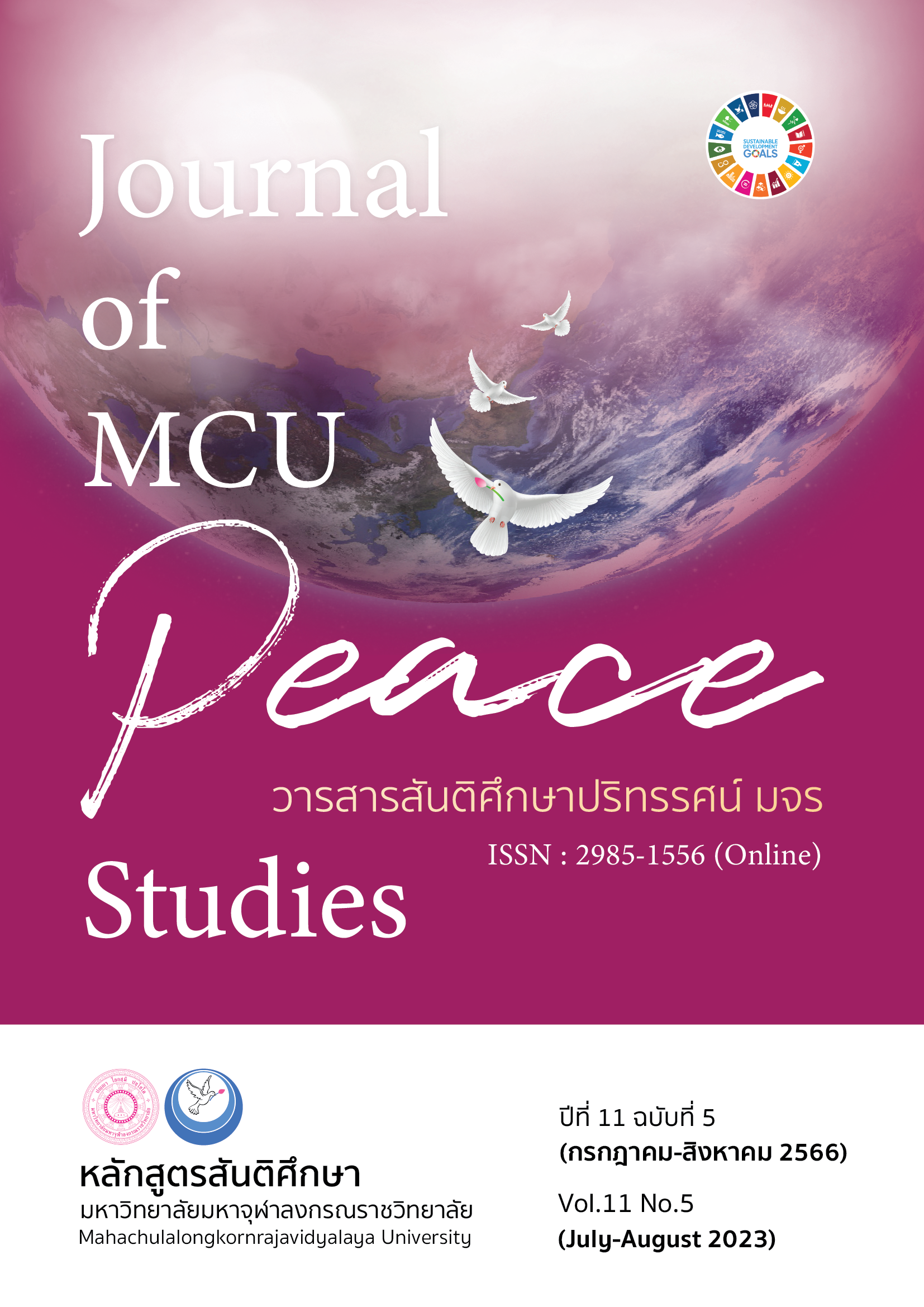การขับเคลื่อน Soft Power: อัตลักษณ์ท้องถิ่นภาคใต้ เพื่อส่งเสริมการท่องเที่ยวจังหวัดชุมพร
Main Article Content
บทคัดย่อ
การวิจัยนี้มีวัตถุประสงค์ 1. เพื่อศึกษาการขับเคลื่อน Soft Power: อัตลักษณ์ท้องถิ่นภาคใต้ เพื่อส่งเสริมการท่องเที่ยวจังหวัดชุมพร 2. เพื่อศึกษาปัญหาและอุปสรรคของการขับเคลื่อน Soft Power: อัตลักษณ์ท้องถิ่นภาคใต้เพื่อส่งเสริมการท่องเที่ยวจังหวัดชุมพร และ 3. เพื่อศึกษาแนวทางการขับเคลื่อน Soft Power: อัตลักษณ์ท้องถิ่นภาคใต้เพื่อส่งเสริมการท่องเที่ยวจังหวัดชุมพร เป็นการวิจัยเชิงคุณภาพ ผู้ให้ข้อมูลสำคัญ คือ ตัวแทนภาครัฐ สมาคม/เครือข่ายการท่องเที่ยว ภาคเอกชน และภาคประชาชน รวม 22 คน ใช้การคัดเลือกแบบเจาะจง เครื่องมือที่ใช้ในการเก็บข้อมูล คือ แบบสัมภาษณ์แบบกึ่งโครงสร้าง ทำการวิเคราะห์ข้อมูลโดยใช้วิธีการสรุปความแบบพรรณนา
ผลการวิจัยพบว่า 1. การขับเคลื่อน Soft Power การทำงานเป็นไปในลักษณะการบูรณาการภารกิจร่วมกัน กระตุ้นให้ประชาชนในท้องถิ่นเห็นความสำคัญของ Soft Power และเข้ามามีส่วนร่วมในการดำเนินงาน การจัดกิจกรรมการส่งเสริม เช่น จัดแสดงและจำหน่ายสินค้าจากชุมชน จัดกิจกรรมส่งเสริมวัฒนธรรมของท้องถิ่นผ่านงานเทศกาลและประเพณีต่างๆ การใช้ประโยชน์จากสิ่งที่มีอยู่ในท้องถิ่น เช่น อาหาร ศิลปะ วัฒนธรรม กีฬา ภูมิปัญญา และสถานที่ท่องเที่ยว สร้างการรับรู้จากรุ่นสู่รุ่นเพื่อสืบสานวัฒนธรรมท้องถิ่นให้คงอยู่ และการผลักดันให้ประชาชนและผู้ประกอบการในท้องถิ่นใช้ Social Platform เป็นเครื่องมือ ให้ประชาชนเป็นสื่อบุคคลในการถ่ายทอดอัตลักษณ์ท้องถิ่นสู่สาธารณชน 2. ปัญหาและอุปสรรคของการขับเคลื่อน Soft Power ได้แก่ บุคลากรภาครัฐและประชาชนยังขาดความเข้าใจใน Soft Power ขาดการสนับสนุนจากรัฐบาล ขาดการบูรณาการการทำงานอย่างแท้จริง ภารกิจทับซ้อน ประชาชนไม่ให้ความร่วมมือ และการจัดกิจกรรมการส่งเสริมเพียงบางอย่าง และ 3. แนวทางการขับเคลื่อน Soft Power ได้แก่ ควรสร้างกลไกหนุนเสริม สร้างการรับรู้สู่คนภายนอก สร้างความเข้าใจและความภูมิใจในอัตลักษณ์ท้องถิ่นให้แก่ประชาชน กระตุ้นให้ประชาชนเข้ามามีส่วนร่วมในการเผยแพร่ รักษา และพัฒนา
Article Details

อนุญาตภายใต้เงื่อนไข Creative Commons Attribution-NonCommercial-NoDerivatives 4.0 International License.
ทัศนะและความคิดเห็นที่ปรากฏในบทความในวารสาร ถือเป็นความรับผิดชอบของผู้เขียนบทความนั้น และไม่ถือเป็นทัศนะและความรับผิดชอบของกองบรรณาธิการ ยินยอมว่าบทความเป็นลิขสิทธิ์ของวารสาร
เอกสารอ้างอิง
Ban Ki-moon. (2008). South Korea’s Soft Power Struggles. Retrieved May 30, 2022, from https://www.eastasiaforum.org/2021/07/20/south-koreas-soft-power-struggles/
Boonyo, N. (2022). Thailand's Soft Power? Meaning, Reality and Dreams. Retrieved April 20, 2022, from https://www.bangkokbiznews.com/blogs/columnist/999871
Chumphon Provincial Governor's Office. (2020). Information for Tourists. Chumphon: Chumphon Provincial Office.
Department of Cultural Promotion. (2019). Southern Cultural Heritage. Bangkok: Agricultural Cooperative Assembly Printing House of Thailand.
Gao, S., Huang, S., & Huang, Y. (2009). Rural Tourism Development in China. International Journal of Tourism Research, 11(5), 439–450.
Jansuri, A. (2017). Spinning Learning, Art Viewing, Prasat Tai: Community-Based Tourism Activities. Creative. In the 6th National Academic Conference 2017 ASEAN 50 Plus: Uniqueness in Diversity. Friday, August 18, 2017, at the Auditorium, Headquarters, Thai Airways International Public Company Limited.
Kornphetcharat, K. (2022). The Thai Government and Pushing for Local Soft Power When It Has to Formally ‘Build’ The System Is Not Because of 'Luck'. Retrieved August 5, 2022, from https://thestandard.co/thai-gov-and-local-soft-power/
Kraft, M. E., & Furlong, S. R. (2004). Public Policy: Polities Analysis and Alternatives. Washington D.C.: CQ Press.
Lopattananont, T. (2022). Pointing Out the Future of Thai Soft Power. Should Fix Weaknesses and Develop Urgently to Enter the Global Market. Retrieved November 21, 2022, from https://www.springnews.co.th/digital-tech/.technology/832285
Manager Online. (2022). Take off the Lesson "Purple Sticky Rice Fever" Is Still Not Soft Power, just a Great Trend! Retrieved April 25, 2022, from https://mgronline.com/daily/detail/9650000038551
Namburi, S., & Manmee, T. (2020). Public Participation in the Preservation and Revitalization of Local Cultural Traditions in Chaiyaphum Province. Journal of Legal Entity Management and Local Innovation, 7(6), 125-136.
Nye, J. S. (2004). Soft Power: The Means to Success in World Politics. New York: Public Affairs.
Phrakhrubaidikawichan (Songrasri), & Phosing, P. (2022). Local Identity to Creative Tourism Management. Journal of Buddhist Studies Vanam Dongrak, 9(2), 127-140.
Rojjanawongsakul, K. (2022). A Case Study of the Success of the South Korean Entertainment Industry. Journal of Public Administration and Politics, 11(2), 124-143.
Somboonphon, U. et al. (2017). Forms of Cultural Activities for the Development of Tourist Attractions in the Province of Samut Songkhram. Pathum Thani: Western University.
Suan Dusit University. (2022). Thai People and Soft Power. Retrieved June 21, 2022, from https://suandusitpoll.dusit.ac.th/
Sukontasap, R. (2018). Management of Soft Power Resources in Thailand. Ratthapirak Journal, 60(3), 47-55.
Tangsukeesiri, P. (2022). Guidelines for Tourism Promotion Based on Local Food Soft Power in Sukhothai Province. Journal of Management Science Pibulsongkram Rajabhat University, 4(2), 77- 89.
Vorapamorn, P., & Bisonyabut, N. (2022). Soft Power Thai, Why Is It Still Not Working? Retrieved April 20, 2022, from https://tdri.or.th/2022/04/soft-power-thai/
Wattanavrangkul, P. (2022). Encourage “New Generation” to Use Soft Power to Propel Cultural Heritage. Retrieved April 20, 2022, from https://www.thaipbs.or.th/news/content/314474
White, A. T. (1982). Why Community Participation? A Discussion of the Arguments. Community Participation: Current Issue and Lesson Learned. New York: United Nations Children’s Fund.


